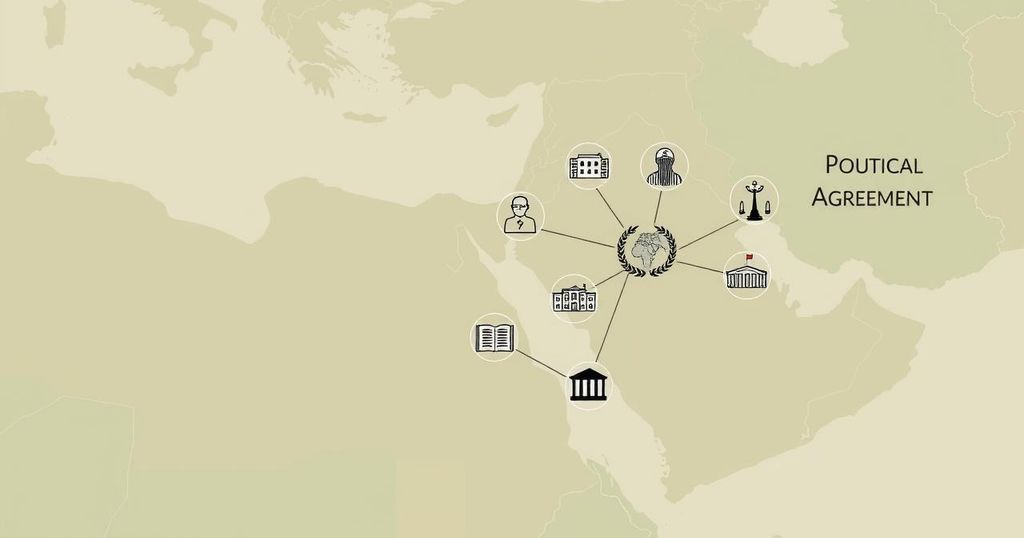A new peace agreement between Syria’s transitional government and the Kurdish SDF aims to create stability and equality in Syria. While Kurdish leaders welcome the initiative, analysts express skepticism regarding its feasibility, citing regional power struggles and differing visions for Syria’s future. The outcome may significantly influence both Syrian and Iraqi political landscapes.
A historic peace agreement was recently signed in Damascus between Syria’s transitional government and the Kurdish-led Syrian Democratic Forces (SDF), instilling cautious optimism among Iraqi Kurdish leaders. The agreement, finalized by interim president Ahmed Al-Sharaa and SDF Commander Mazlum Abdi, aims to establish stability, unity, and democratic reforms within Syria, which has endured years of turmoil.
Key provisions of the agreement ensure equal political opportunities for all Syrians, with meritocracy rather than ethnic or religious affiliation guiding roles in state institutions. The Kurdish community, historically marginalized in Syrian society, is recognized as essential to the state, receiving full citizenship rights and constitutional protections. Additionally, the framework enforces a nationwide ceasefire and mandates the integration of civil and military institutions in northeastern Syria under the control of the central government in Damascus.
While Iraqi Kurdish political figures are optimistic about the agreement’s regional implications, the Iraqi government has not yet issued a formal response. Fethullah Husseini, a representative of the Autonomous Administration of North and East Syria, views the deal as pivotal for establishing peace and stability in Syria, which would consequently benefit Iraq and the broader Kurdish region. He asserts that the recognition of Kurdish rights within Syria’s future constitution signals a victory not only for Syrian Kurds but for the Kurdish population across neighboring countries.
Prominent Kurdish leaders, including Pavel Jalal Talabani and Nechirvan Barzani, have expressed their support for the agreement, labeling it a step towards coexistence and stability. Barzani emphasized the importance of protecting the rights of all Syrian communities, while urging for active participation in nation-building efforts.
Despite the optimism from Kurdish leaders, several analysts remain skeptical about the agreement’s feasibility, citing a lack of necessary foundations for successful implementation. Kamaran Mantik, a political professor, raises concerns that the differing visions of the Kurds and the Syrian government may hinder progress. He speculates that Damascus might leverage the agreement tactically to alleviate international criticism rather than out of a genuine commitment to peace.
Complicating matters, broader geopolitical tensions also challenge Syria’s future. Regional powers, each with their interests, may shape the outcome of this agreement. The U.S. has welcomed the partnership, calling for non-sectarian governance as a pathway to peace. Meanwhile, Turkey’s President Erdogan insists on the complete implementation of the agreement, asserting that Syrian citizens will reap the benefits.
As Syria navigates this critical juncture, the success or failure of the Damascus agreement will greatly influence the potential for enduring peace and unity, or whether entrenched divisions persist due to decades of conflict.
In conclusion, the recent agreement between Syria’s transitional government and the SDF stands as a pivotal moment for both Syria and the Kurdish population. While the agreement aims to foster peace, stability, and equality, skepticism remains regarding its actual implementation amidst complex regional dynamics. The reactions from Iraqi Kurdish leaders demonstrate a hopeful perspective, yet analysts caution that real progress may be impeded by fundamental differences in vision and broader geopolitical conflicts. Ultimately, the effectiveness of this agreement will play a critical role in determining the future stability of Syria and its impact on Iraq.
Original Source: www.newarab.com




